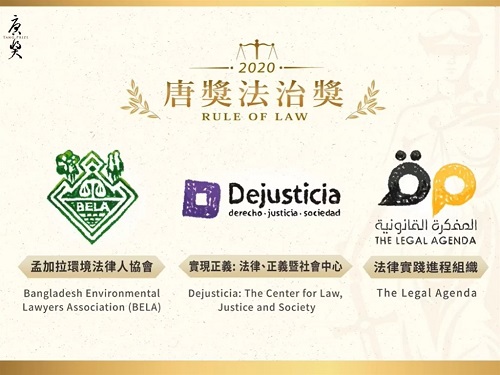The Legal Agenda Wins International Tang Prize in Rule of Law with Two Other Organizations

The Legal Agenda, jointly with the Bangladesh Environmental Lawyers Association (BELA) and the Centre for the Study of Law, Justice, and Society (Dejusticia) in Colombia, has won the 2020 Tang Prize in Rule of Law.
The Tang Prize Foundation announced in a statement that the three organizations deserved the prize “for their efforts in furthering the rule of law and its institutions through education and advocacy”. This is the first time since the prize’s establishment in 2012 that it has been awarded to organizations and not individuals.
While the Legal Agenda is delighted to receive this award, which is a mark of appreciation for all the efforts our cohesive team has made over the past years, we also realize that this is a time not for celebrating what has been achieved but for expending more efforts to help defend our Arab societies. In this sense, this award is merely an incentive to redouble our efforts and expand our responsibilities in Lebanon, Tunisia, and the other Arab countries where we have been able to work.
The Tang Prize Foundation’s statement explained that the three organizations share four features:
First of all, they are under the conditions where the foundations of the rule of law are under great challenges; secondly, they are committed to promoting, to improving and to furthering the rule of law and its institutions; thirdly, they utilize strategic litigations that are based on solid academic research, pushing for governmental actions to serve the law’s purpose to protect; finally, they are all dedicated to advancing the general public’s understanding of the rule of law through education and advocacy, pushing forward the idea that everyone can contribute to the realization of the rule of law.
Established by Taiwanese entre+preneur Dr. Samuel Yin, the international Tang Prize is awarded biennially and consists of four categories, namely Rule of Law, Sustainable Development, Biopharmaceutical Science, and Sinology. The prize seeks to promote interaction and cooperation between culture and technology to find a 21st-century path to sustainable development.
When introducing the laureates, the statement explained,
Since its establishment in 2009, The Legal Agenda has managed to operate against the backdrop of an influx of refugees, corruption and the public’s pervasive distrust of the judicial organs. The Organization has successfully strengthened judicial independence and the rule of law in Lebanon through a multidisciplinary approach that is built on researching and monitoring the judiciary; helping in forming a club for judges to consolidate their independence from political interference; preparing a draft law for the independence of the judiciary and building support for it; promoting social debates and public support for judicial independence.
The Legal Agenda intends to transform the general public’s opinion from being skeptical of the justice system to being willing to pursue legal avenues to defend the rights of their own and others’. In doing so, The Legal Agenda focuses on helping the people become more receptive to the process of capacity-building on legal knowledge, a process which can sharpen the public awareness of using legal means to change the Arab societies and to improve the people’s living standards.
In addition, The Legal Agenda spoke up for marginalized groups and achieved major legal precedents in order to advance the legal protection for migrant workers, refugees, the LGBT community, and the families of the victims of forced disappearance. To broaden the public’s knowledge of the rule of law and strengthen their legal defense, The Legal Agenda also developed model defenses as guidelines when it comes to vulnerable groups’ vindication. Its pioneering approach has expanded beyond Lebanon to other Arab countries, notably in Tunisia where it has set up an office.
As for BELA, it was established in 1992 in Bangladesh, where it works to promote the rule of law and establish environmental justice through public interest litigations, legislative advocacy, and research and publication. Since 1994, the organization has filed more than 300 public interest lawsuits and advocated legislative reform for environmental justice.
Founded in 2005, Dejusticia is a Colombia-based research and advocacy organization that believes that academic research can make a valuable contribution to social justice and social reform. Through campaigning, litigation, and publishing, it devotes much effort to upholding human rights, especially by filing and winning landmark cases on sensitive issues such as discrimination, the rights of indigenous people and refugees, and environmental degradation.
One of the most prominent cases that Dejusticia has supported was filed against the Colombian government by 25 youth arguing that the deforestation of the Amazon violates youth and children’s constitutional rights. In 2018, the Supreme Court of Colombia recognized the Amazon as an “entity subject of rights” and subsequently ruled that the government is obliged to protect and conserve it.
The Legal Agenda and Dejusticia work together within the framework of the South-South Collaboration on Socio-Economic Rights, which aims to strengthen social and economic rights in the Global South through support for judicial accountability, strategic litigation, and experience sharing and synergy.
More information about the prize is available on its website.



